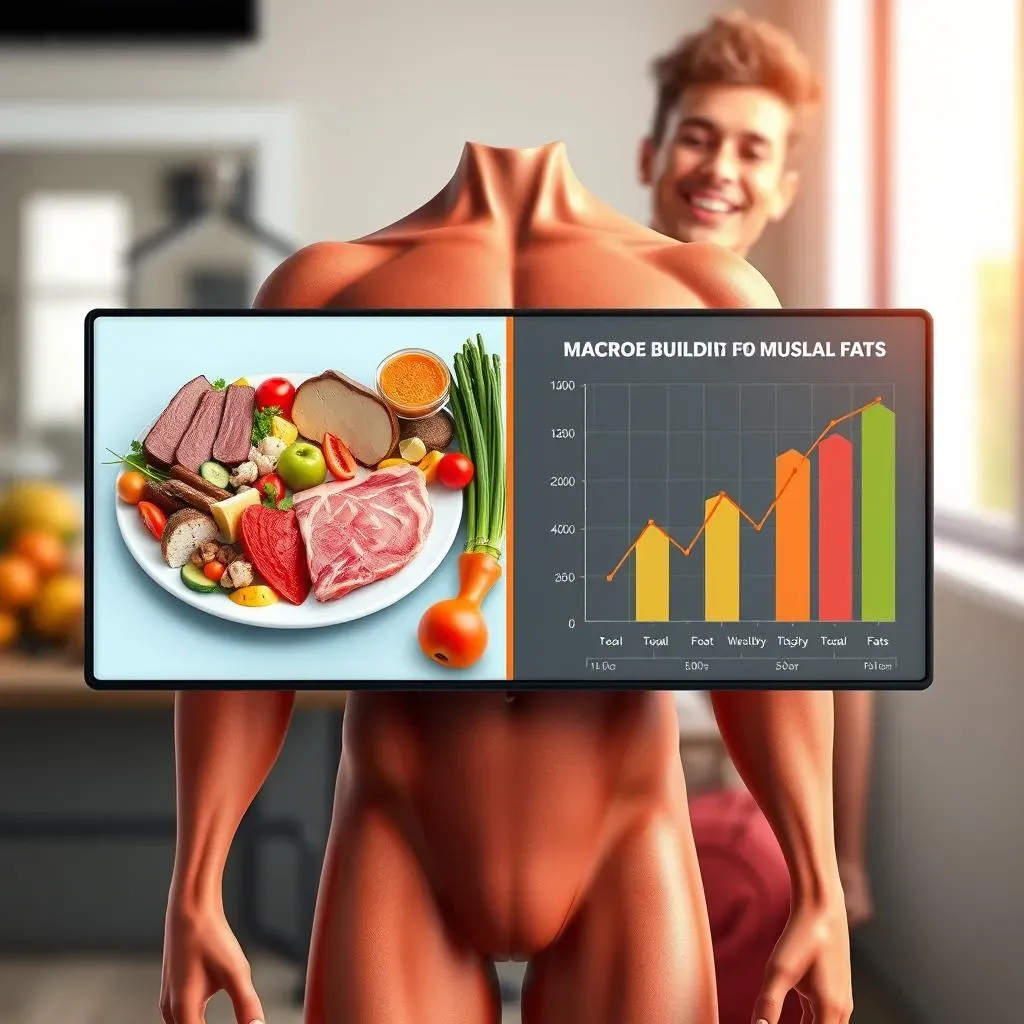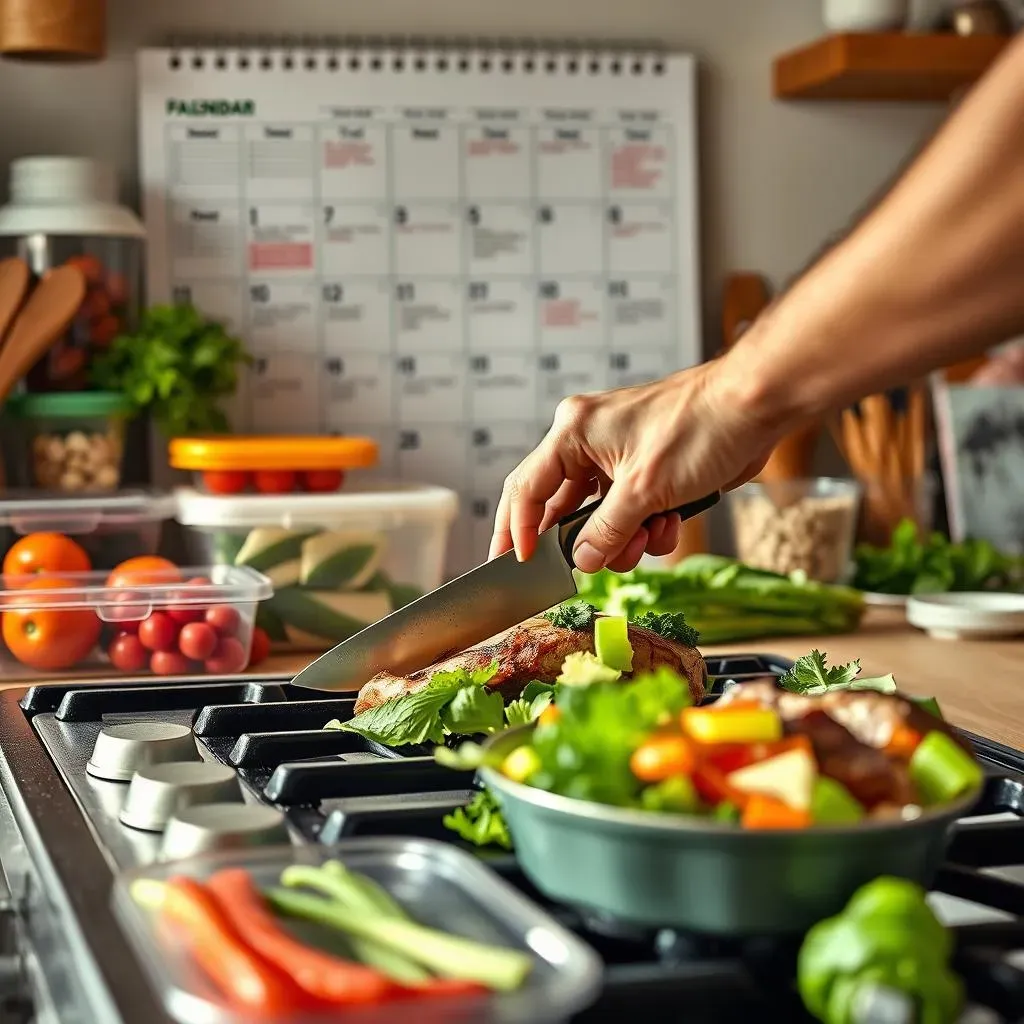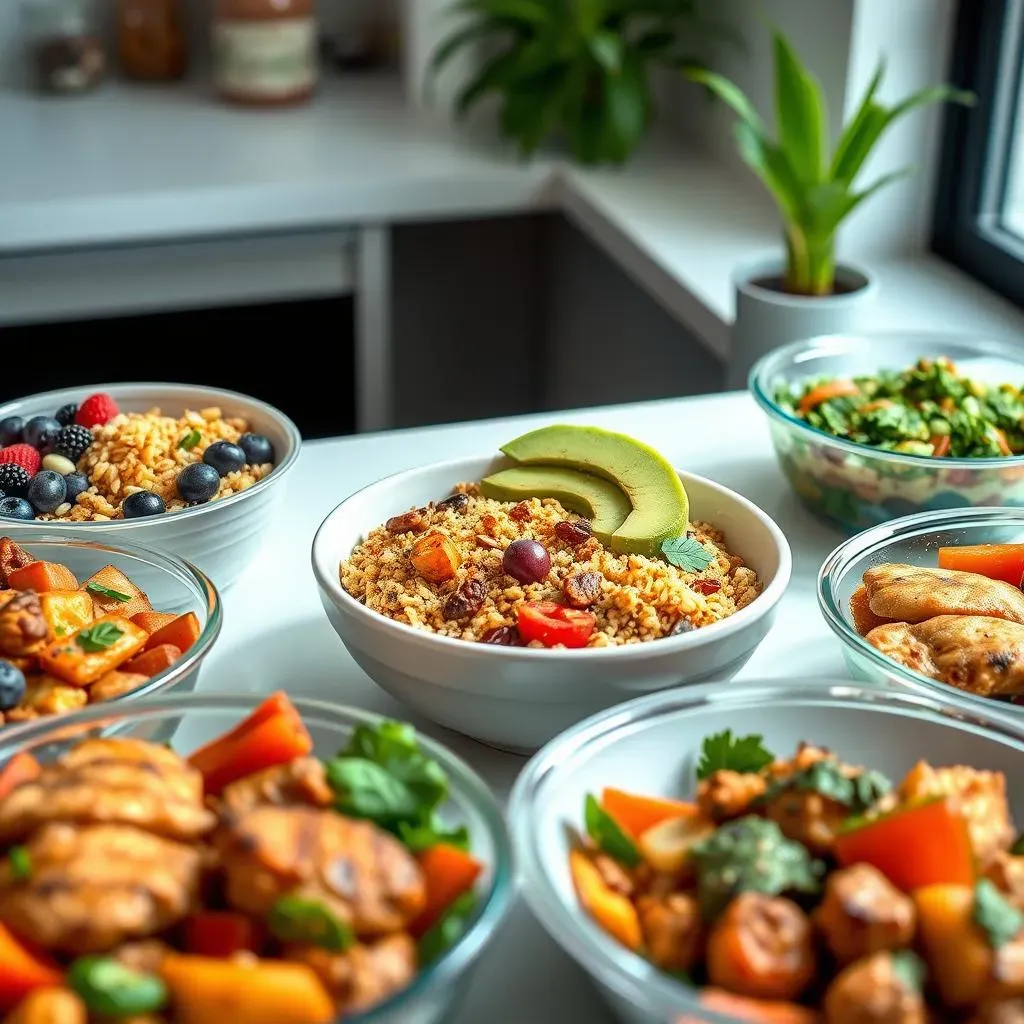Table of Contents
Are you tired of feeling like you can't pack on the pounds? Do you dream of building muscle but struggle to eat enough? You're not alone! Gaining weight can be just as challenging as losing it, but the secret weapon is smart planning. This is where "meal prep ideas gain weight" comes to the rescue. This article is your guide to mastering meal preparation for healthy weight gain. We'll begin by breaking down how many calories you actually need to gain weight, making sure you’re not just eating more, but eating right. Then, we will tackle the macronutrient puzzle, showing you the best balance of carbs, fats, and protein to build muscle effectively. Next, we'll dive into practical strategies to make meal prep easy, efficient and sustainable, because, let’s be honest, no one wants to spend their entire weekend in the kitchen. Finally, we'll share some delicious and easy-to-make recipes specifically designed to help you gain weight. Get ready to transform your approach to eating and start seeing the gains you’ve been working towards.
Understanding Calorie Needs for Weight Gain

Understanding Calorie Needs for Weight Gain
The Calorie Basics
Okay, so you wanna gain weight, specifically muscle, right? It's not just about eating everything in sight. It's about understanding your body's energy needs. Think of calories like fuel for your engine. If you want to grow, you need more fuel than you’re burning. It's as simple as that. The first step is figuring out your baseline – how many calories you burn just existing. This is called your Basal Metabolic Rate (BMR), it's like the energy your body uses to keep your heart beating and your lungs breathing even if you just lay in bed all day. But of course we are not doing that, are we?
Now, the real fun starts. You need to add extra calories on top of your BMR, to actually gain weight. This is where people often get confused. It's not about just adding a random amount, it is about finding the right balance that works for you.
Calculating Your Calorie Surplus
So how do you figure out this magic number? A simple way to get started is to multiply your current body weight in pounds by 11 if you're a guy, or by 10 if you're a gal. This gives you a rough estimate of your daily calorie needs to maintain your weight. Now, for weight gain, you need to add a surplus. A good starting point is to add 250-500 calories per day. This allows for a healthy and sustainable rate of gain. Don't go overboard; slow and steady wins the race, like in the fable of the tortoise and the hare, remember that one?
For example, if you're a 150-pound guy, you'd start with about 1650 calories (150 x 11). To gain weight, you'd aim for about 1900 to 2150 calories per day. Remember, these are just estimates, and you might need to adjust depending on your activity level and how your body responds. Don't be afraid to experiment and find out what works for you.
Activity Level | Calorie Adjustment |
|---|---|
Sedentary | +200-300 calories |
Lightly Active | +300-400 calories |
Moderately Active | +400-500 calories |
Very Active | +500-600 calories |
Tracking and Adjusting
Alright, so you've got your calorie target, but how do you know if it's working? Well, consistency is key. Track your intake for a week or two, and see how your weight changes. If you're not gaining weight, bump up your calories slightly. If you’re gaining too fast, dial it back a bit. It's a learning process, and you're the scientist in your own experiment. You need to be honest with yourself and adjust accordingly.
Don't get discouraged if it takes some time to figure out the sweet spot. It's not a perfect science, your body is always changing, and what worked for you last month might not work this month. Listen to your body, be patient, and remember that consistency is the key.
Macronutrient Balance for Muscle Growth

Macronutrient Balance for Muscle Growth
The Protein Powerhouse
Alright, so you've got the calorie thing down, now let's talk about the real muscle builders: macronutrients. Think of them as the building blocks of your body. Protein is the king when it comes to muscle gain. It's like the bricks and mortar that your muscles need to grow and repair. You can't just eat a bunch of donuts and expect to get jacked. You need protein, and lots of it. It's not just about eating any protein, it's about eating enough high-quality protein throughout the day. This ensures your muscles have a steady supply of what they need to grow. Aim for about 0.8 to 1 gram of protein per pound of body weight daily. That's a good starting point. For example, a 150-pound person should aim for 120 to 150 grams of protein per day.
I remember when I first started out, I was so focused on just eating more that I completely forgot about protein. I was basically just eating a bunch of carbs, and it wasn't doing anything for my muscle growth. Once I started prioritizing protein, I saw a huge difference. So, don't make the same mistake I did, make protein your priority.
Carbs and Fats: The Supporting Cast
Okay, protein is the star, but carbs and fats are the awesome supporting cast. Carbs are your body's main energy source, especially for those tough workouts. Think of them as the fuel that keeps you going. They replenish your glycogen stores, which are like the gas tanks in your muscles. Without enough carbs, you'll feel tired and sluggish, and your workouts will suffer. Opt for complex carbs like brown rice, sweet potatoes, and oats, they provide a more sustained energy release. Fats, on the other hand, are essential for hormone production and long-lasting energy. They also help your body absorb certain vitamins. Don't be afraid of fats, they're not the enemy. Include healthy fats from sources like avocados, nuts, and olive oil. You need a balance of all three macronutrients to fuel your body effectively.
It's like building a house, you need the bricks (protein), but also the electricity (carbs) and the foundation (fats). They all work together to create something strong and awesome. So don't neglect any of them.
Macronutrient | Role | Good Sources |
|---|---|---|
Protein | Muscle growth and repair | Chicken, beef, eggs, tofu, lentils |
Carbohydrates | Energy for workouts and recovery | Brown rice, sweet potatoes, oats, quinoa |
Fats | Hormone production and long-term energy | Avocados, nuts, olive oil, fatty fish |
Finding Your Ideal Ratio
So, what's the perfect ratio of protein, carbs, and fats? It's not a one-size-fits-all answer. However, a good starting point is a 35% carb, 25% fat, and 40% protein split. This ensures you're getting enough of everything without overdoing it on any one macronutrient. But remember, this is just a starting point. You might need to adjust based on your individual needs and how your body responds. Pay attention to how you feel. If you're feeling tired, or not making any progress, make some adjustments. It's all about finding what works best for you, and that takes time and experimentation. Be patient with yourself and remember that it is a marathon, not a sprint.
It's like a recipe, you might need to tweak it a bit to get it just right. Don't be afraid to experiment and find what works best for your body. And remember, consistency is key, so stick with it. I have experimented with different ratios of macros and found that the 40-30-30 split works best for me, but you might be different. Do your own research, track your progress and find your sweet spot.
Effective Meal Prep Strategies for Weight Gain

Effective Meal Prep Strategies for Weight Gain
Planning is Your Superpower
Alright, so you've got your calorie and macro targets, but now comes the real test: making it all happen. Meal prep isn't just about cooking a bunch of food; it's about having a solid plan. It's like a blueprint for your success. Start by deciding which meals you want to prep for the week. Are you going for breakfasts, lunches, dinners, or all of the above? Consider your schedule, what you like to eat, and how much time you have to cook. Don't try to do too much at once, especially when you're just starting out. Begin with a few meals and then gradually increase as you get the hang of it. It’s all about making it work for you and your lifestyle.
I remember my first meal prep attempt, it was a complete disaster. I tried to make too many different meals at once, and ended up with a huge mess in the kitchen and a fridge full of food I didn’t even want to eat. Learn from my mistakes; start small, plan ahead, and keep it simple. You'll thank me later.
The Art of Batch Cooking
Once you've got your plan, it's time to get cooking. The secret weapon here is batch cooking. This means preparing large quantities of meals at once. It's more efficient and saves you a lot of time during the week. Think of it like this: instead of making a single chicken breast, cook a whole tray of them. Then you've got protein ready for multiple meals. The same goes for rice, veggies, and other staples. Batch cooking is a game-changer, it will free up your time and make eating healthy much easier.
I used to dread cooking, it felt like a chore. But once I started batch cooking, it became much more manageable, and I actually started to enjoy it. Plus, it saved me a ton of time and stress during the week. So, if you want to make meal prep sustainable, batch cooking is a must.
"The key is not to prioritize what's on your schedule, but to schedule your priorities." - Stephen Covey
Storing and Reheating Like a Pro
Okay, so you've cooked all this amazing food, now what? Proper storage is key to keeping your meals fresh and delicious. Invest in some good quality airtight containers. Glass containers are great because they don't absorb odors or stains, but plastic works too. Portion out your meals into individual containers, so they're ready to go whenever you need them. If you have leftovers, freeze them for later. This is a great way to prevent food waste. When it comes to reheating, don't be afraid to add some extra seasonings or a splash of water to keep your meals moist and flavorful.
I used to just throw my meals into any old container, and they would end up tasting like cardboard by day two. Learning how to store and reheat food properly made a huge difference in the quality of my meal prep. So, invest in some good containers and don't be afraid to experiment with different reheating methods.
Storage Method | Duration |
|---|---|
Refrigerator | Up to 4-5 days |
Freezer | Up to 2-3 months |
Delicious Meal Prep Recipes to Gain Weight

Delicious Meal Prep Recipes to Gain Weight
Alright, let’s get to the good stuff – the recipes! You've got the knowledge, now let's put it into action with some seriously tasty meal prep ideas designed to help you pack on the pounds. We're not talking about boring, bland dishes here, we're talking about flavorful, satisfying meals that you’ll actually look forward to eating. Think of these recipes as your secret weapons in the battle to gain weight. We're going to focus on meals that are high in calories, protein, and all the good stuff you need to grow. From breakfast to dinner, we've got you covered with options that are both easy to make and incredibly delicious. So, grab your aprons, and let's get cooking!
Breakfast Power Bowls
Kickstart your day with a breakfast that's packed with protein and complex carbs. These bowls are not only delicious but also incredibly customizable. Start with a base of cooked quinoa or oats, then add a scoop of protein powder, some berries, nuts, and a drizzle of honey or maple syrup. You can also throw in some chia seeds or flax seeds for extra nutrients and healthy fats. Feel free to get creative with your toppings, the possibilities are endless. If you are feeling fancy, add a dollop of Greek yogurt or some peanut butter for added flavor and calories. This is a great way to fuel up for the day and get those gains started early.
- Base: Cooked quinoa or oats
- Protein: Protein powder, Greek yogurt
- Fruits: Berries, banana
- Healthy Fats: Nuts, seeds, peanut butter
- Sweetener: Honey, maple syrup
Hearty Lunchtime Burrito Bowls
Lunch doesn't have to be boring! These burrito bowls are a fantastic way to pack in a ton of calories and nutrients. Start with a base of brown rice, then add a generous portion of your favorite protein, like grilled chicken, ground beef, or black beans. Top it off with some sautéed bell peppers, onions, corn, and a dollop of guacamole or sour cream. For an extra kick, add a dash of hot sauce or some salsa. These bowls are not only delicious but also super easy to prep in advance. You can customize them to your liking and change up the ingredients each week, so you never get bored.
Component | Options |
|---|---|
Base | Brown rice, quinoa |
Protein | Grilled chicken, ground beef, black beans |
Veggies | Bell peppers, onions, corn |
Toppings | Guacamole, sour cream, salsa |
Dinner: The Ultimate Chicken and Veggie Bake
For dinner, let’s make something that’s both comforting and packed with nutrients. This chicken and veggie bake is a winner. Simply toss chicken breast or thighs with your favorite veggies like potatoes, carrots, broccoli, and bell peppers. Drizzle everything with olive oil, season with salt, pepper, and herbs, then bake in the oven until everything is cooked through. This is a great way to get a balanced meal with plenty of protein, carbs, and healthy fats. You can also add some cheese on top for extra calories and flavor. It’s easy, delicious, and perfect for meal prepping.
Remember, meal prepping is all about finding what works for you. Don’t be afraid to experiment with different recipes and ingredients. The most important thing is to be consistent and to enjoy the process. With a little planning and effort, you’ll be well on your way to gaining weight and building muscle.
"The only way to do great work is to love what you do." - Steve Jobs
Wrapping Up Your Weight Gain Journey
So, there you have it. Meal prepping for weight gain isn't just about eating more; it's about eating smarter. You now know how to calculate your calorie needs, balance your macronutrients, and implement effective meal prep strategies. You also have some tasty recipes to get you started. Remember, consistency is key, and patience is your best friend. It's not a race, it's a journey. Embrace the process, tweak your approach as needed, and most importantly, enjoy the delicious food you are preparing. With the right meal prep ideas, you can absolutely gain weight and build the muscle you desire. Now go forth, prep those meals, and get ready to see those gains!